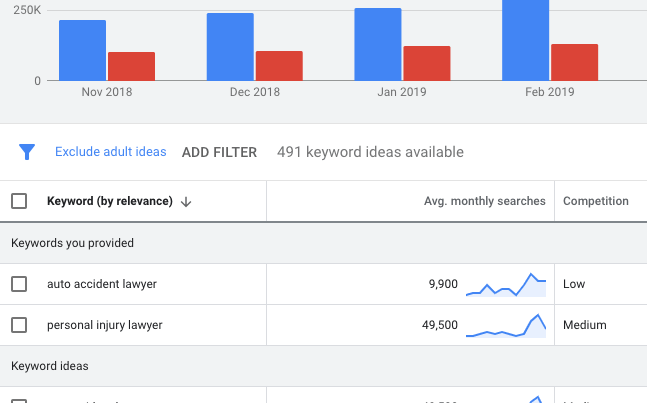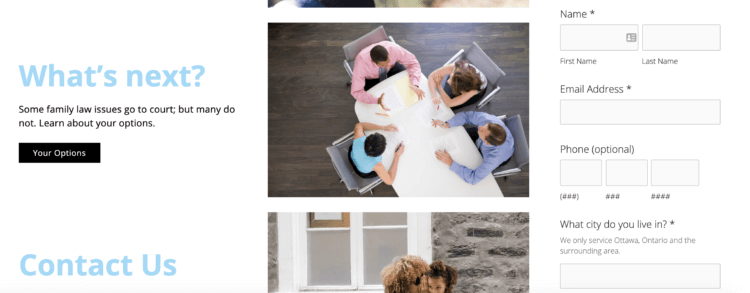To secure a steady stream of cases, law firms need a robust strategy for lead generation. By effectively leveraging a combination of Google and Facebook for driving traffic, alongside a strong intake and lead qualification process, firms can convert website visitors into paying clients.
To grow your firm, you need a healthy pipeline of qualified leads. In other words, law firms should set resources aside for law firm lead generation.
Let’s start first by explaining what a lead is. A lead is someone genuinely interested in your law firm and the services you provide—they’re a potential client.
In this article, we’ll talk about two different kinds of leads—qualified and unqualified.
With Clio Grow’s email marketing software for law firms, you can create, send, and track email campaign performance all withing your case management software.

Qualified vs. unqualified leads
A qualified lead is a potential client who matches your ideal client profile in terms of need, budget, timing, and more. For example, if you’re focused on business law, and someone who filled out the “contact us” form on your website owns a small business and is looking for the type of services you provide, that’s a qualified lead.
Most law firm lead generation tactics will attract both unqualified and qualified leads. An unqualified lead is a potential client who does not match your ideal client profile. However, you can’t find out whether a visitor to your website is qualified or unqualified unless you figure out which they are—before spending time on a free consultation.
It’s possible to collect qualified leads for your law firm through your law firm’s website, saving you time and money. But when it comes to driving visitors to your site in the first place so that you can qualify them, the digital marketing world can be a jungle. You may find yourself wondering: Where do I start? What platform is best? Should I use Facebook or Google?
The answer is both. Facebook and Google are a dynamic duo for bringing in qualified leads. Here’s how to use them together to generate more qualified leads for your law firm.
Five ways to get started with law firm lead generation
1. Install the Meta Pixel (formerly the Facebook Pixel)
The Meta Pixel is a small piece of code that Facebook generates for you to place in your website header. The Pixel will track the visitors to your website. It then sends the data back to Facebook to give you the ability to “retarget” visitors to your website. (More on this later).
Picture this: You are a family law firm. You have a woman on your website looking for a good attorney for her divorce. She loves what she sees, but, soon enough, one of her kids starts crying and she doesn’t get a chance to reach out to you. Normally, this lead would be lost. However, since the Facebook Pixel is installed, you will be able to get back in front of her and give her another chance to get in touch. Once you install the Meta Pixel, law firm lead generation will be automated from Facebook.
2. Set up Google Ads
Once you set up Meta Pixel, it’s time to drive traffic to your website via a Google Search Campaign. If people search for terms related to your practice areas on Google, they’re likely already in the market for your services. For example, if someone is searching for “personal injury lawyer near me,” and you’re a personal injury lawyer, you’ll want to make sure you’re in front of that person in their Google searches.
From the image below, you can see that “personal injury lawyer” gets 49,500 searches each month while “auto accident lawyer” gets about 9,900 searches. Those are a lot of potential visitors to your site!

With a sound search campaign structure, your website should place at or near the top of Google search results. If you haven’t created a Google search campaign before, read this step-by-step guide to get started.
Should you run a Google Ad or Facebook Ad first? When considering law firm lead generation, how do you know which is best? It’s important to remember, Facebook isn’t a search engine, Google is. By using Google as a first option, you’re getting in front of the people who are actively searching for a law firm online.
You should also add Local Services Ads through Google. In short, Local Services Ads are pay-per-lead ads offered through Google that appear at the top of search engine results. They match prospective customers searching for a service with relevant businesses in the same area. Best of all, you only pay when a potential lead contacts you through the ad, resulting in higher quality leads and cases. And, with Google’s Local Services Ads for Clio, you can sign up for and manage a Local Services Ads account, set up and run ad campaigns, capture new leads, and measure campaign performance all within a single platform. Learn more here, or book a live demonstration with a Clio expert.
3. Set up a cohesive intake process
The third step, arguably the most important for collecting qualified leads, is ensuring you have a strong case management and client intake system set up. A strong system helps your firm create a good experience for new potential clients and ensures no new leads fall through the cracks. Clio Grow, which is part of the Clio Suite, is an excellent option for law firms that want to automate their monotonous tasks and streamline their intake process.
Clio Grow is also great for nurturing leads, which should follow your law firm lead generation work. With Clio Grow, you can easily engage with your leads, automate repetitive tasks, and be more personable.
4. Retarget your site visitors
It’s finally time to retarget your website visitors.
Retargeting is a way to get back in front of your website visitors that didn’t convert into a lead. For example, if they first arrived on your site via a Google search, but maybe they received a phone call or another life interruption prevented them from converting. Using the Facebook pixel to capitalize on this traffic is the secret to capturing more interest and generating more pre-qualified leads.
Have you ever visited someone’s website, and then all of a sudden, you have their ads in your newsfeed? This means they likely had a Meta Pixel installed and served you a Facebook retargeting ad. How does this relate to law firm lead generation? These ads tend to get the most attention at the most affordable cost—when structured correctly.
One look and one click of a well-structured Facebook advertisement, and the prospective client looking for a divorce attorney is back on your website. You can read about how to create a Facebook ad in Clio’s guide to Facebook advertising for law firms.
Now, you may be thinking, “That sounds great! But how do I know these potential clients are ready and willing to hire me?”
The answer is that you pre-qualify them.
5. Pre-qualify new leads
When you pre-qualify your leads, you weed out the people who may not be serious about working with you. One of the main benefits of doing this is that you can spend your time and energy with the leads who are very interested in working with you—thus, increasing your chances of turning potential clients into paying clients.
The best way to do this is to ask a series of qualifying questions within a lead capture form (a form that you embed on your website to get your website visitor’s contact information). This might look like a “contact us” form, a “request for consultation” form, or something else—just as long as you’re collecting the right information to ensure any potential client is a good fit for your firm.
For example, the intake form on Fresh Legal’s website asks, “what city do you live in?” to ensure any potential clients are within the geographical areas they serve.

For example, your lead capture form should ask the following questions at minimum:
- First Name
- Last Name
- Phone Number
Then, you’ll want to add some questions specific to the matters your firm handles. Here are some examples of pre-qualifying questions (please customize them to fit your firm):
Are you currently working with an attorney? (Multiple Choice Answers: Yes, No, Yes but I’m looking to hire someone new). By asking this question, you know where they are in the process of selecting a lawyer.
Please tell us about your case. This is crucial. The people who take the time to fill out detailed information are typically the ones that are ready to move forward but are just looking for the right attorney.
Are you ready to get to work on your case right now? (Yes, No) This is one of the most critical qualifying questions you can ask. If someone answers “No”, depending on your practice area, you can add them to your email marketing list and start a nurture sequence of 5-6 emails. In these emails you will warm them up or “nurture” a lead towards being more likely to hire you with free, useful information related to the type of issue they’re facing.
For example, if you handle divorces, you may want to share checklists of what to do immediately after a separation, guides on how to keep the process as smooth as possible for children involved, or links to the websites of recommended counsellors for those facing especially emotional separations. This will make potential clients feel more comfortable with you handling their case, and over time, you’ll build trust and turn that “No” into a “Yes”.
Try to err on the side of caution. Consider putting a disclaimer at the bottom of your form stating that the form is for informational use only. Specify that the form does not establish an attorney/client relationship.
Conclusion
When you decide to jump into the digital marketing world, it can seem daunting and overwhelming. However, it doesn’t have to be. Using Google and Facebook together for law firm lead generation positions you to generate qualified leads who are ready to invest in your firm to help them win their case. Don’t forget that setting up an intake system, like the one offered with the Clio Suite, is a vital part of securing those qualified leads. Firms should strive to give the best client experience while generating quality leads.
With Clio Grow’s email marketing software for law firms, you can easily set up, send, and track the success of your email campaigns. Check it out!
Clio Grow email marketingSubscribe to the blog
-

Software made for law firms, loved by clients
We're the world's leading provider of cloud-based legal software. With Clio's low-barrier and affordable solutions, lawyers can manage and grow their firms more effectively, more profitably, and with better client experiences. We're redefining how lawyers manage their firms by equipping them with essential tools to run their firms securely from any device, anywhere.
Learn More
